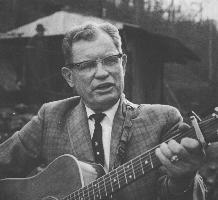SIXTEEN TONS
(GEORGE DAVIS?) (1930s)





Miners resented the company store for three reasons: prices were much higher than those charged by independent retail stores, their grocery and supply bills were checked off their earnings even before they received their pay, and trading was compulsory. It hurt the miner's pride to know that he was being robbed in the "pluck-me,'' his term for the company store. Responsibility for budgeting family income was shifted from the housewife, where it was in normal households, to the company store manager. Moreover, the debts which a miner piled up in the store bound him as securely to his employer as miners were bound to feudal barons in medieval Scotland....Many coal corporations issued their own money, which for all purposes took the place of United States currency. This phony money, called scrip, took various forms such as pasteboards, coupon books, paper bills called shinplasters, brass checks, and metal discs with holes through them like Turkish piasters.... In states where the law barred the issuance of scrip, coal companies distributed wage advances or store orders, but the miners regarded them as just another form of scrip.... Chronic layoffs, part-time work, and low wages made the ground fertile for scrip as its purpose was to tide over the miner from one payday to another.
When an operator was unable to expand his mining capacity or the volume of his sales, he would increase the number of his miners. This would so cut each man's working time and earnings that it left no surplus to spend outside the camp. Because of monopoly, there was no limit to the height to which a company store could hike its prices. John McBride, president of the United Mine Workers of America (1892-1894), related how an Ohio coal operator of his acquaintance worked two mines for thirteen months and made a profit of only $287. During the same period his store, which without the mines would have been worth nothing, earned him a net profit of $22,000.
An unscrupulous store-keeping coal operator who sought to undersell the market could do so simply by cutting the price of coal below cost and making up his operating losses out of company-store receipts. It was a competitive device often resorted to, especially in the South, where non-union operators thereby were enabled to take business away from Northern operators.
George Korson, Coal Dust on the Fiddle, Hatboro, PA, 1965, pp. 72-73.

When I first met him [George Davis] at the Hazard radio station in 1959, he was very hesitant about doing any recording because of his previous bad experience with the records business. He claims to have composed "Sixteen Tons" during the 1930s, and feels that Merle Travis and Tennessee Ernie Ford capitalized on his song through changing the chords somewhat. George's original version is on this record....According to George Davis, this song was first called "Nine-to-Ten-Tons,'' and he wrote it in reference to "this particular mine (which) had what is known as a Clean-up System. This was before the days of the UMW. In a clean-up system you either cleaned up your place every day, or brought your tools out (quit ? ). An old expression the operator used then was, 'We've got a barefooted man waiting for your job.' Here's the catch -- each place would make nine or 10 tons, but where you loaded this coal was very low; most of them had water in them -- as much as three or four inches -- and they had no pumps. On top of this you might have a cut of draw rock from 8 to 12 inches thick, 14 feet wide, and up to 9 feet long. All the coal, rock, and anything like wrecks, tore up track. All that was 'dead work' and it always had to be cleaned up, even if it took you 18 or 19 hours to do it."
John Cohen, liner notes for "When Kentucky Had No Mining Men" (FOLKWAYS FA 2343; 1967)


CHORUS:
I loaded sixteen tons and what do I get
Another day older and deeper in debt.
Saint Peter don't call me cause I can't go
I owe my soul to the company store.I was born one morning, was a drizzling rain
A fussing and fighting ain't my middle name.
Well they raised me in a corner by a Mammy hound
I'm as mean as a dog but I'm as gentle as a lamb.CHORUS
Well I got up one morning, the sun didn't shine,
I picked up my shovel and I went to the mine,
I loaded sixteen ton of that number four coal
The face boss said, ''Well bless my soul!"CHORUS
I loaded sixteen tons, I tried to get ahead,
Got deeper and deeper in debt instead.
Well they got what I made, and they wanted some more,
And now I owe my soul at the company store.CHORUS
Well I went to the office to draw some script
The man, he told me -- was a wreck in the dip.
To clear the tracks would be a week or more
But your credit's still good at our company store.CHORUS
If you see me coming, step aside.
A lot of men didn't and a lot of men died
I got a fist of iron, I got a fist of steel,
The left one don't get you then the right one will.CHORUS


